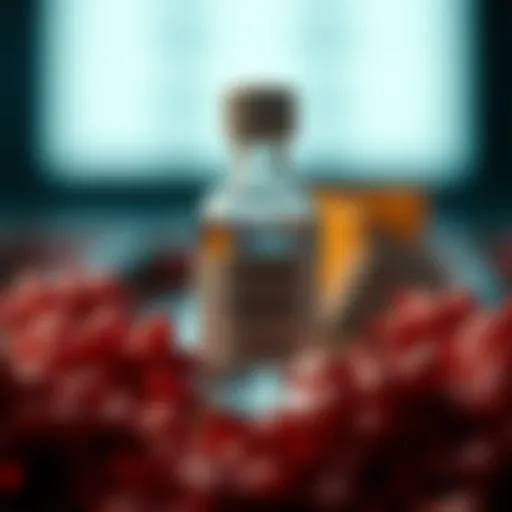Effective Ways to Remove Buttocks Blackheads
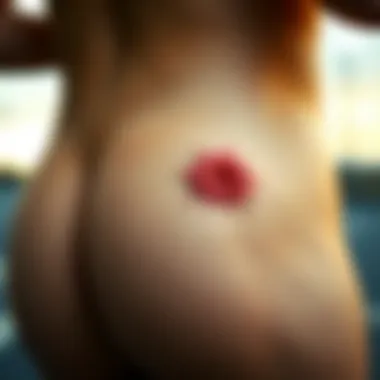

Intro
Blackheads can be a pesky nuisance, even in unexpected places such as the buttocks. Many people may associate blackheads solely with the face or other prominent areas, but the reality is that they can surface anywhere there are pores. Understanding the underlying causes of blackheads is crucial to addressing them effectively. This article takes a detailed look at how to tackle this issue head-on, providing practical advice and actionable steps. With this guide, readers can achieve smoother skin and regain their confidence without resorting to harsh methods or treatments.
We'll cover a variety of techniques and approaches, from simple home remedies to professional options. Learning about prevention, care routines, and the right products tailored for the skin on the buttocks can make a significant difference in minimizing blackheads. Let's dive into this unsung topic and explore how to reclaim the skin's health and appearance back to its best.
Key Takeaways
- The buttocks have pores that can develop blackheads due to oils and dead skin cells.
- Maintaining proper hygiene and a suitable skincare routine is vital for prevention.
- Various treatment options exist, from DIY remedies to advanced professional treatments.
- Smooth skin can be achieved without needing invasive procedures by employing practical skin care methods.
Blackhead Facts
- Studies show that nearly 50% of adults have experienced blackhead formation at some point in their lives.
- The presence of blackheads does not indicate poor hygiene but is often a result of excess oil production and dead skin accumulation.
Practical Tips
To maintain healthy skin in this area and reduce blackheads effectively, consider the following actionable steps:
- Regular Exfoliation: Use a gentle exfoliating scrub or a brush to remove dead skin cells. This allows for healthier skin to flourish.
- Cleanse Properly: A proper cleansing routine helps keep oil in check. Use non-comedogenic products to avoid clogging pores.
- Moisturize: Keeping the skin hydrated with appropriate moisturizers can aid in preventing excessive oiliness, helping reduce blackheads. Look for lightweight formulas that won’t clog pores.
- Consider Steaming: Applying steam can help open up pores, making it easier to cleanse and treat the skin.
By incorporating these habits into your routine, you can substantially lower the risk of blackheads rearing their heads again. Consistent care, awareness of your skin's unique needs, and maintaining a balanced approach lead to healthier skin overall.
Understanding Blackheads
Understanding the nature of blackheads is crucial, particularly when looking at their appearance on the buttocks. By grasping what they are and why they occur, one can better tackle the issue, thus minimizing the chances of new ones springing up. It’s also important as finding effective solutions hinges on understanding the underlying factors at play.
What Are Blackheads?
Blackheads are a type of acne, medically referred to as open comedones. They form when hair follicles become clogged with dead skin cells, oil, and bacteria. Unlike whiteheads, where the clogged pore remains closed, blackheads are exposed to air, causing oxidation at the surface. This is what gives them their characteristic dark color. When it comes to their appearance on the buttocks, they may not be as visible as those on the face, but they can still be troublesome and affect one’s confidence.
Why They Form on the Buttocks
The buttocks aren’t commonly thought of as a hotspot for blackheads, yet the skin in that area is just as prone to blockages due to a variety of factors. Excessive sweating, poor air circulation in clothing, and the natural oils produced by the skin can all contribute to the formation of these blemishes. Furthermore, skin cells can accumulate more easily in this area, especially if hygiene is not adequately observed. This makes it all the more necessary to understand the conditions that allow blackheads to flourish here, as prevention is better than cure.
Common Misconceptions
There are many myths surrounding blackheads that can cloud judgment. For instance, some believe that only individuals with oily skin are prone to them, but that’s not entirely true. Even those with dry skin can experience blackheads if the right conditions are met. Another misconception is that blackheads are solely a problem for adolescents; however, adults can also struggle with them due to hormonal fluctuations, stress, or dietary choices. Busting these myths not only helps in recognizing the issue but also paves the way for finding effective solutions.
Identifying Contributing Factors
Understanding the factors that contribute to blackhead formation on the buttocks is crucial in tackling this issue effectively. It’s not simply about removing the pesky comedones; it’s about addressing the root causes as well. Identifying what leads to blackheads can drastically enhance the effectiveness of treatments and increase the chances of long-term success.
Here are three significant contributing elements to consider:
Skin Type and its Role
Each person has a distinct skin type—oily, dry, combination, or sensitive. Oily skin, in particular, is prone to excess sebum production, which can clog pores and lead to blackheads. Conversely, dry skin might seem less susceptible, but if moisture is lacking, it can cause dead skin cells to accumulate and mix with sebum, resulting in a fresh crop of blackheads.
To address these issues, consider adopting targeted skin care approaches:
- For oily skin: Look for non-comedogenic moisturizers and gentle exfoliants containing salicylic acid.
- For dry skin: Incorporate hydrating ingredients like hyaluronic acid or squalane to maintain moisture balance.
- Combination skin might require a more tailored approach, using different products on different areas.
It's important to note that skin type can also change over time, influenced by climate, hormonal fluctuations, and lifestyle choices. Regularly assess your skin condition to adjust your care routine accordingly.
Dietary Influences
Your eating habits play a significant role too. Certain foods can exacerbate oil production in the skin. Greasy foods and those high in refined sugars can trigger increased sebum production, contributing to blackhead formation. Additionally, dairy products may be a problem for some individuals, as studies suggest a link between milk consumption and acne-related issues.
Here are some dietary adjustments to consider for healthier skin:
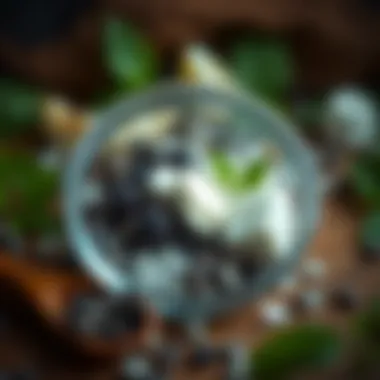

- Hydrate: Drinking plenty of water supports skin health and helps maintain a balanced moisture level.
- Fiber-rich Foods: Incorporate fruits, vegetables, and whole grains that promote digestive health; proper digestion can reflect positively on skin health.
- Limit Processed Foods: Reducing intake of processed, sugary, or fatty foods can keep oil production in check. Opt for whole foods that are nutrient-dense.
Hygiene Practices
While it is important to maintain a good hygiene routine, many people overlook specific practices that can prevent blackheads from forming. Daily habits can either contribute to or help eliminate blockages within the skin.
Consider these hygienic measures:
- Shower Regularly: Especially after sweating. Make sure to cleanse that area with a gentle body wash.
- Exfoliate: Utilize gentle exfoliation techniques or products, around once a week, to remove dead skin cells without causing irritation.
- Avoid Tight Clothing: Opt for breathable fabrics to minimize sweat and friction. Tight-fitting clothes can trap moisture and bacteria, leading to breakouts.
“By paying attention to skin type, dietary choices, and hygiene practices, you can take a proactive stance against blackhead formation, ensuring healthier and smoother skin.”
In summary, recognizing these contributing factors aids not just in pinpointing the root causes but also informs actionable steps that can be taken. Each component plays a pivotal role in managing blackheads on the buttocks, and addressing them holistically will yield the best results.
Prevention Strategies
Prevention is often better than cure. When it comes to blackheads on the buttocks, understanding how to prevent them can save a great deal of time, discomfort, and emotional angst associated with their appearance. Focusing on prevention allows individuals not only to maintain skin clarity but also to foster overall skin health. Here’s a dive into practical tactics to keep blackheads at bay.
Maintaining Proper Hygiene
Proper hygiene is the bedrock of skincare, especially when dealing with body areas prone to excess oil and debris. This doesn't mean a simple rinse in the shower is enough. Here’s how to enforce effective hygiene practices:
- Shower Regularly: Water, soap, and a gentle scrubber can help remove dirt and sweat that accumulate. A daily shower, particularly after exercise, is advisable.
- Use Exfoliating Products: Choose body scrubs containing salicylic acid or glycolic acid. They help slough off dead skin cells that can clog pores.
- Don't Rush: Give yourself a few minutes in the shower for thorough cleaning. Pay special attention to areas like the buttocks, where sweat tends to accumulate.
Maintaining proper hygiene could seem tedious, but think of it as a safeguard against blackheads. Regular cleaning routines minimize the chances that oil and dead skin will build up, potentially leading to breakouts.
Choosing the Right Clothing
Clothing can have a surprising impact on skin health. It's not just about comfort; the fabric and fit can play a critical role in preventing blackheads.
- Opt for Breathable Fabrics: Select clothing made from natural fibers like cotton or bamboo. These materials allow for better air circulation.
- Avoid Tight Clothing: Though it may be stylish, tight clothing can trap heat and sweat against the skin. This creates a breeding ground for bacteria and blockages.
- Consider Moisture-Wicking Options: For those who sweat more, clothes that wick moisture away from the skin can help keep the area dry.
Choosing the right clothing isn’t merely a fashion statement; it's a necessary action to ensure proper skin health. By being mindful about what one wears, it's possible to reduce the likelihood of developing blackheads.
Adjusting Your Diet
The adage you are what you eat rings true, especially for skin health. Nourishing the body with the right foods can impact the formation of blackheads.
- Hydration is Key: Drinking plenty of water flushes out toxins and keeps the skin hydrated, preventing it from overproducing oil.
- Eat More Fruits and Vegetables: Foods rich in antioxidants, vitamins, and minerals boost skin health. Cucumbers, tomatoes, and leafy greens are fantastic for hydration.
- Limit Processed Sugars and Fats: Diets high in sugar and unhealthy fats can lead to oily skin, which makes it easier for blackheads to form.
"A balanced diet plays a foundational role in maintaining skin health. What you consume reflects on your skin’s surface."
Incorporating dietary changes may seem like a simple adjustment, yet it can have expansive benefits. By focusing on nourishment, individuals set the stage not just for better-looking skin, but also for enhanced overall well-being.
Home Remedies for Blackhead Removal
Home remedies for blackhead removal can be a game-changer in tackling this common skin issue, especially when it comes to the often-overlooked region of the buttocks. Unlike professional treatments that might deplete your wallet, home remedies utilize readily available ingredients that are gentle on the skin. This makes them not only cost-effective but also less abrasive compared to harsher chemical options. When approached with care and consistency, these remedies can significantly improve the appearance of your skin.
Natural Exfoliants
Natural exfoliants are a key element in the journey to eliminate blackheads. These are substances that help remove dead skin cells from the surface of the skin, promoting new cell regeneration. Sugar, baking soda, and oatmeal are popular choices that serve this purpose well.
- Sugar – This is often touted as a great scrub due to its granular texture. A simple mix of sugar and coconut oil can create a powerful scrub. Rub it gently on the affected areas to slough away dead skin, revealing fresher skin beneath.
- Baking Soda – This household staple not only neutralizes bacteria but also helps to exfoliate. Create a paste with water and gently massage it onto the blackhead-prone areas. Rinse thoroughly afterward.
- Oatmeal – Known for its soothing properties, oatmeal can also be an effective exfoliant. Mixing oatmeal with honey forms a paste that can be applied and let sit for a while; it’ll help draw impurities out without any harshness.
Use of Clay Masks
Clay masks often come up in the discussion of skincare, and for good reason. They boast the ability to absorb excess oil and impurities from the skin, making them effective for blackhead removal. Clay types such as bentonite or kaolin are particularly useful in this context.
- Bentonite Clay – When mixed with water or apple cider vinegar, it forms a thick paste that can be applied to the buttocks. Leave it on until it dries, then rinse off. This process eliminates the dirt and reduces the chance of clogged pores.
- Kaolin Clay – Gentle and suitable for all skin types, kaolin clay can help cleanse without stripping the skin of essential moisture. This is especially important since the buttocks can be sensitive.
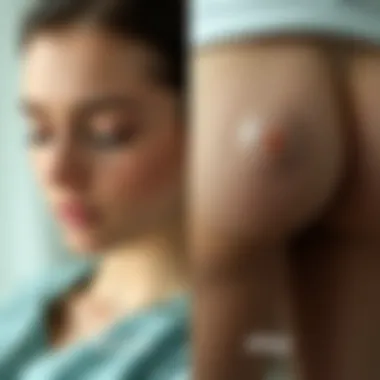

Regular application of these masks can reduce the appearance of blackheads and improve overall skin texture.
Essential Oils and Their Benefits
Essential oils are often undervalued in home remedies, but some can work wonders on blackheads. These oils can have antibacterial, antifungal, and anti-inflammatory properties, making them worth considering.
- Tea Tree Oil – Renowned for its antiseptic qualities, this oil can help combat bacteria responsible for blackhead formation. Diluting a few drops in a carrier oil like coconut oil and applying it to the problematic area can show benefits over time.
- Lavender Oil – Besides its pleasant scent, lavender oil can soothe the skin and reduce stress, which is notable since stress can subtly contribute to skin problems.
"Incorporating essential oils into your skincare regimen can enhance not just skin health but also overall wellness."
- Peppermint Oil – This refreshing oil can stimulate blood circulation, promoting healthier skin while offering an invigorating sensation.
When using essential oils, always make sure to dilute them properly to prevent irritation.
Over-the-Counter Treatments
When it comes to tackling blackheads, especially in hard-to-reach areas like the buttocks, over-the-counter treatments can be a game-changer. These products are designed to address clogged pores effectively and often contain ingredients that exfoliate and clear skin. They provide an accessible means for people looking to manage their skin without dipping into the more intense or costly professional options.
Opting for over-the-counter solutions can be particularly beneficial due to their ease of use and availability. Many people prefer addressing skin concerns in the comfort of their own homes, where a little bit of trial and error is doable. However, it's crucial to choose wisely and understand what each treatment offers and its suitability for different skin types.
Cleansers and Exfoliants
Using cleansers that contain active ingredients like salicylic acid or glycolic acid can greatly enhance your fight against blackheads. These acids work by penetrating deep into the pores, dissolving the dirt and oil that can wreak havoc on skin health.
- Salicylic Acid: Great for oily and acne-prone skin, salicylic acid exfoliates and unclogs pores while reducing inflammation.
- Glycolic Acid: This offers more physical exfoliation and can leave skin feeling fresher and smoother.
It's wise to look for formulations specifically designed for regions prone to blackheads. Many products also combine cleansing and exfoliating agents for a more comprehensive feel, cutting down the number of steps in your routine.
Pore Strips Effectiveness
Pore strips, often seen as a quick fix, can provide an immediate visual difference while removing blackheads. These strips function by adhering to the skin and pulling out impurities when removed.
However, their effectiveness varies. Some folks swear by them and find pore strips to be a lifesaver, while others might find them to be overhyped. Here are some things to keep in mind:
- Temporary Solution: Pore strips only address the surface level, meaning that while they can unclog pores, they won't prevent blackheads from forming later.
- Irritation Risk: If the skin is sensitive, pore strips can cause redness or irritation. Always test a small area before applying broadly.
Topical Retinoids
For individuals seeking to take a more proactive approach, topical retinoids can be remarkably effective. These vitamin A derivatives not only speed up cell turnover but also help prevent the clogging of pores that leads to blackheads.
While available in various strengths, it’s best to start with a lower concentration and observe how the skin reacts. Regular use can yield significant improvements over time. What’s notable is that retinoids can also assist in reducing the appearance of pores and wrinkles, thus offering additional skin benefits.
Remember, consistency is key with retinoid use. An initial adjustment period where skin may feel dry or irritated is common. Patience pays off.
In summary, over-the-counter treatments for blackheads provide a toolkit of options for those looking to manage skin issues effectively. From cleansers brimming with salicylic acid to the occasional use of pore strips, understanding the intricacies of these solutions can empower anyone to achieve smoother skin. By being mindful of your skin type and its specific needs, you can make informed choices that lead to lasting improvements.
Professional Treatments
When it comes to tackling those stubborn blackheads that can form on the buttocks, professional treatments are often the most effective route to clear skin. These methods provide targeted solutions that go beyond home remedies or over-the-counter options, addressing the issue from the root cause. They not only help in removing existing blackheads but also assist in improving overall skin texture and health.
Understanding the types of professional treatments available is crucial. Each has its unique advantages, depending on your skin type and specific concerns. Plus, it’s essential to have expert guidance to avoid potential complications, which can happen if you attempt to manage this at home.
Microdermabrasion
Microdermabrasion is one such treatment that gently exfoliates the skin using tiny crystals or a diamond-tipped wand. This process works wonders for blackheads by removing dead skin cells and unclogging pores. It’s like giving your skin a deep cleanse, making it look rejuvenated.
Patients often report feeling less oily and seeing an instant improvement in their skin’s appearance. The procedure is relatively quick, taking about 30 minutes, and there’s virtually no downtime. However, multiple sessions may be needed to reach optimal results. This treatment is suitable for almost all skin types, but those with severe acne or rosacea may need to consult with their dermatologist to determine if it is the right option.
Chemical Peels
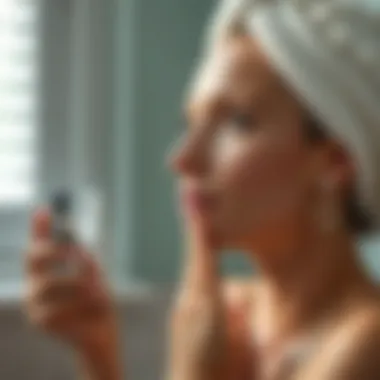

Chemical peels involve the application of a solution that causes the top layer of skin to slough off. This method is particularly effective for treating blackheads that have formed due to excessive oil production or improper exfoliation. Peels can vary in strength, from superficial to deep, depending on the desired results and skin type.
This treatment not only clears existing blackheads but also promotes new, healthier skin cells to surface. Post-treatment, patients usually notice a more even skin tone and reduced appearance of pores. Like microdermabrasion, chemical peels should ideally be performed by a certified professional to minimize risks of irritation or adverse reactions. It’s important to follow up with proper skincare afterward to ensure lasting results.
Extraction by a Dermatologist
Face it, sometimes blackheads require a hands-on approach. Extraction performed by a qualified dermatologist is a straightforward solution. Using sterile tools, the dermatologist can carefully extract blackheads without damaging the surrounding skin. This method is often preferred for those who have deep-set blackheads that won't budge with regular treatments.
The benefits of professional extraction are clear: it provides immediate results, as you can see the difference right away. However, this technique does come with a caveat; improper extraction can lead to scarring or infection, which is why it’s vital to choose a qualified and experienced dermatologist. They will also be able to provide advice on maintaining your skin post-extraction to prolong the results.
"Choosing a professional treatment can be a game-changer in dealing with blackheads, offering results that home treatments sometimes just can't achieve."
In summary, professional treatments offer substantial benefits for clearing blackheads from the buttocks, with options like microdermabrasion, chemical peels, and extraction providing tailored solutions. Investing in a professional approach not only addresses the current blemishes but also enhances skin health for the long term.
Post-Treatment Care
After addressing blackheads on the buttocks through various methods, be it home remedies or professional treatments, the next step is post-treatment care. This phase is crucial as it can determine the success of the treatment you've undertaken. Proper post-treatment care not only aids in healing but also minimizes the likelihood of future breakouts. Ignoring this area can lead to adverse effects, such as irritations or infections, which would be counterproductive to your primary goal of achieving clearer skin.
Maintaining Skin Health
To keep the skin on your buttocks in pristine condition, it is essential to follow a consistent skin care routine. Start with gentle cleansing using products that won't strip the skin of its natural oils. Look for non-comedogenic cleansers, as these won’t clog your pores. After cleansing, moisturize the area to keep it hydrated. Using a lotion that suits your skin type can work wonders. For instance, those with oily skin may prefer lighter, gel-based moisturizers while drier skin types benefit from richer creams.
Moreover, pay attention to any changes in your skin's texture or appearance. If you notice anything unusual, it's best to consult a dermatologist before things escalate. Regular exfoliation, perhaps once a week, can also help in maintaining skin health. This removes dead skin cells and prevents new blackheads from forming.
Managing Skin Sensitivity
Post-treatment, it's possible your skin might react differently, becoming more sensitive than usual. As such, it’s important to manage this sensitivity effectively. Start with a patch test when trying any new product. This is simply applying a small amount in an inconspicuous area and observing how your skin reacts. Listen to your body; if a product causes burning or discomfort, stop using it.
Consider using products with gentle ingredients, like aloe vera or chamomile, to soothe any irritation. Avoid rigorous scrubbing or using harsh exfoliants. Instead, opt for products that are specifically designed for sensitive skin. This considerate “slow and steady” approach will help your skin recover while minimizing any discomfort you might experience.
Signs of Infection
Post-treatment also requires vigilance. Keep an eye out for potential signs of infection, which could manifest after the extraction or treatment of blackheads. Symptoms may include:
- Increased redness or swelling.
- Pus or unusual discharge from the treated area.
- Excessive warmth in the area, indicative of inflammation.
- Persistent pain or discomfort.
If you observe any of these signs, it’s imperative to address them promptly. An untreated infection can lead to more serious skin issues. It would be smart to consult with your healthcare provider if you suspect anything. They can prescribe treatments to get you back on track and maintain your skin health up to snuff.
Keeping an eye on skin health after treatments is just as vital as the treatments themselves. Prevention and timely response can lead to much better outcomes.
Addressing Recurrence
Addressing the recurrence of blackheads on the buttocks is essential not just for maintaining smooth skin, but also for upholding overall skin health. While removing blackheads might provide immediate relief, without the right precautions, those pesky bumps could come back to haunt you quickly.
Understanding why they reappear helps in taking proactive steps to make sure they don't latch on to your skin again.
The most important element in addressing recurrence is recognizing that this isn't a one-time fix. To avoid falling into the cycle of removing and letting them come back, consider integrating strategies into your daily routine. The benefits of staying ahead of this issue include improved skin appearance, better moisture retention, and less irritation.
"An ounce of prevention is worth a pound of cure." – Benjamin Franklin.
This old adage applies well here, signifying that investing time in preventive measures pays off by reducing future treatments.
Lifestyle Adjustments
Making small, yet impactful lifestyle adjustments can greatly minimize the chances of developing blackheads again. Here’s where you need to look:
- Diet Considerations: A diet rich in fruits, vegetables, and lean proteins not only improves skin health but also helps regulate oil production. Avoiding overly greasy foods and sugars may keep your skin clearer.
- Hydration: Drinking enough water is essential. When your body is adequately hydrated, your skin can maintain its natural moisture balance, which may ward off blackhead formation.
- Avoid Tight Clothing: Wearing tight-fitting clothes can trap sweat and oils. Opt for breathable fabrics to keep the skin area cool and dry, reducing the chances of clogged pores.
Regular Skin Care Routine
A consistent skincare routine tailored specifically for your skin type is crucial in preventing blackheads. Steps to include:
- Gentle Cleansing: Start off with a gentle cleanser that targets excess oil without over-drying your skin.
- Exfoliation: Exfoliating 1-2 times a week helps slough off dead skin cells. Whether it's a chemical exfoliant like salicylic acid or a physical one like sugar scrubs, find what works for you.
- Moisturizing: Keeping the skin hydrated with a light, non-comedogenic moisturizer can help maintain skin barrier health, which is vital for preventing blackheads.
- Sunscreen: Don't forget to apply sunscreen daily. Sun damage can lead to thicker skin layers, increasing the chance for clogged pores.
Consulting with a Professional
Sometimes, addressing blackhead recurrence merits the expertise of a professional. Here are scenarios where reaching out to a dermatologist or esthetician is beneficial:
- Skin Type Assessment: A professional can effectively evaluate your skin type and provide personalized advice and treatments.
- Adaptation of Treatments: If you've tried various over-the-counter products without success, they can advise alternative therapies that might be more effective.
- Routine Follow-Up: Frequent consultations can keep your skin in check and help make adjustments to your routine based on evolving skin conditions.
Staying proactive about these elements ensures that your skin remains clear and healthy. By focusing on lifestyle choices, maintaining a regular skincare routine, and seeking professional guidance, you're not only addressing the root causes of blackheads but also paving the way for healthier skin.





